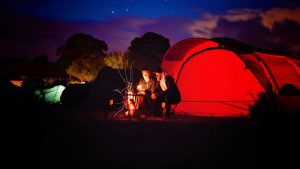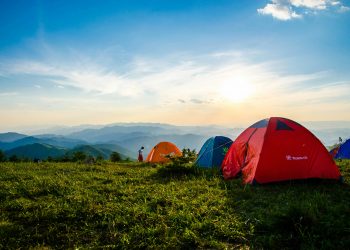Midterms can be a major source of stress, leaving students feeling exhausted and in need of a break. A camping getaway provides a unique opportunity to unwind. The fresh air, physical activity, and change of scenery can invigorate your mind and body, allowing you to return to studies refreshed and recharged.
This article will assist you in planning the perfect midterm camping getaway. We’ll cover everything from choosing a campsite and essential gear to packing and planning activities. By following these tips, you can enjoy a camping trip that helps you combat midterm burnout and come back feeling motivated to tackle the rest of the semester.
Balance Academics and Your Camping Trip
Even during a midterm break, academic responsibilities sometimes can’t be fully ignored. Before your trip, prioritize the most urgent assignments. Bringing study materials like flashcards or notes with you can offer peace of mind and allow you to utilize quiet moments at your campsite for studying.
If juggling coursework creates too much stress, don’t hesitate to seek outside help. Sometimes, it’s worth considering the option to buy custom essays from top expert. Writing services can alleviate pressure with expertly written, plagiarism-free papers, letting you focus on the much-needed mental reset your camping trip will provide.
Choose the Right Campsite
Aligning your campsite with your needs is crucial for a fulfilling midterm escape. Start by researching parks and campgrounds within a comfortable drive, minimizing time spent on the road. Think about your experience level and desired features:
- Developed campgrounds: Offering restrooms, showers, and picnic tables for increased comfort.
- Natural campsites: Providing a raw, unplugged experience for seasoned campers.
- Dispersed camping: Permitted in some national forests (verify regulations beforehand).
- Campground fees and reservation policies: Crucial factors for budgeting and availability.
- Activities: Match your campsite to interests like hiking, fishing, climbing, or wildlife viewing.
Beginner campers often thrive at established campgrounds. Look for sites near well-marked trails for your early forays into outdoor adventuring. Online reviews and park websites will help you find your ideal campground.
Get Essential Camping Gear
Investing in good camping gear significantly enhances your experience. Here’s your breakdown of the essentials:
- Tent: This is your home away from home. Consider the number of people, ease of setup (especially important for solo campers), and how well it handles different weather conditions. Seek out one with excellent waterproofing and ventilation.
- Sleeping bag: Aim for a sleeping bag temperature rated at least 10 degrees Fahrenheit below the lowest temperatures you expect to encounter. Also, consider fill material (down offers warmth-to-weight advantages; synthetic is more budget-friendly) and shape preference (roomy rectangular or cozy mummy).
- Sleeping pad: Don’t underestimate this one! A pad is crucial for insulation from the cold ground and adding cushioned comfort. Consider the R-value (higher means better insulation) and styles like inflatable air pads or closed-cell foam for varying levels of support and packability.
- Beyond the basics: Other helpful gear to consider includes a camp chair, headlamp or lantern for light, cookware and utensils (if campgrounds don’t provide them), and a lightweight camp stove for hot meals.
If you’re just starting out, don’t feel pressure to buy top-of-the-line equipment before knowing what you’ll actually use. Outdoor stores often have rental programs, and experienced friends might be happy to loan you gear to test out. This option keeps the upfront cost low and lets you try before you buy.
Plan Your Meals
Keep things uncomplicated and satisfying. Choose one-pot wonders, easy-to-assemble wraps, or make-ahead foil packet meals. Prioritize shelf-stable ingredients like dried or canned foods, peanut butter, granola, and pasta when feasible.
Pack a cooler for perishables like meats and dairy for the first few days of your trip. Ample water is non-negotiable, but bring a filtration system or water purification tablets to replenish from natural sources safely. Don’t skimp on snacks! Trail mix, dried fruit, and energy bars provide fuel for all your outdoor adventures.
Pack Smart
Strategic packing makes campsite life seamless and maximizes time for exploration. Focus on layering clothing to handle any weather changes – lightweight fleeces, moisture-wicking base layers, and a packable rain jacket are your friends. Also, include:
- Headlamp or flashlight for after-dark navigation;
- First-aid kit for bumps, bites, and scrapes;
- Sun protection, like sunscreen, hat, and sunglasses;
- Insect repellent to keep bugs from spoiling your fun;
- Biodegradable camp soap and basic toiletries.
Remember, less is more! Focus on multi-use clothing and versatile camping essentials for ultimate efficiency.
Learn Campfire Essentials and Safety
Mastering campfire building adds warmth and charm to the camping experience. Educate yourself on fire-starting techniques and always observe local regulations, especially during dry seasons. Prioritize existing fire rings and gather firewood responsibly, being mindful of conservation efforts.
Fire safety demands vigilance. Thoroughly extinguish your fire with water, and don’t leave or go to sleep before all embers become cold. This practice protects the environment and prevents devastating wildfires.
Leave No Trace
Responsible camping respects the beauty you’ve come to enjoy. Embrace the “Leave No Trace” philosophy and carry out all your trash. Minimize your footprint by sticking to established trails.
Be conscientious of other campers by keeping noise levels down, and be sure to properly dispose of food scraps to avoid attracting unwanted animal visitors. By leaving a place as pristine (or better) than you found it, you pay it forward for future generations to savor.
Closing Thoughts
Ditching the dorm room for a few nights under the stars is a powerful midterm stress antidote. Whether you’re a seasoned camper or a curious novice, following these tips will set you up for a fun and fulfilling trip. The mixture of fresh air, wild beauty, and the simple joys of camping create a transformative experience.
So, trade in those textbooks for trekking poles, late-night cram sessions for campfire stories, and return to campus recharged with a renewed sense of focus and motivation. The benefits of your midterm nature break will ripple into all aspects of your student life. Now, get out there and explore!

















